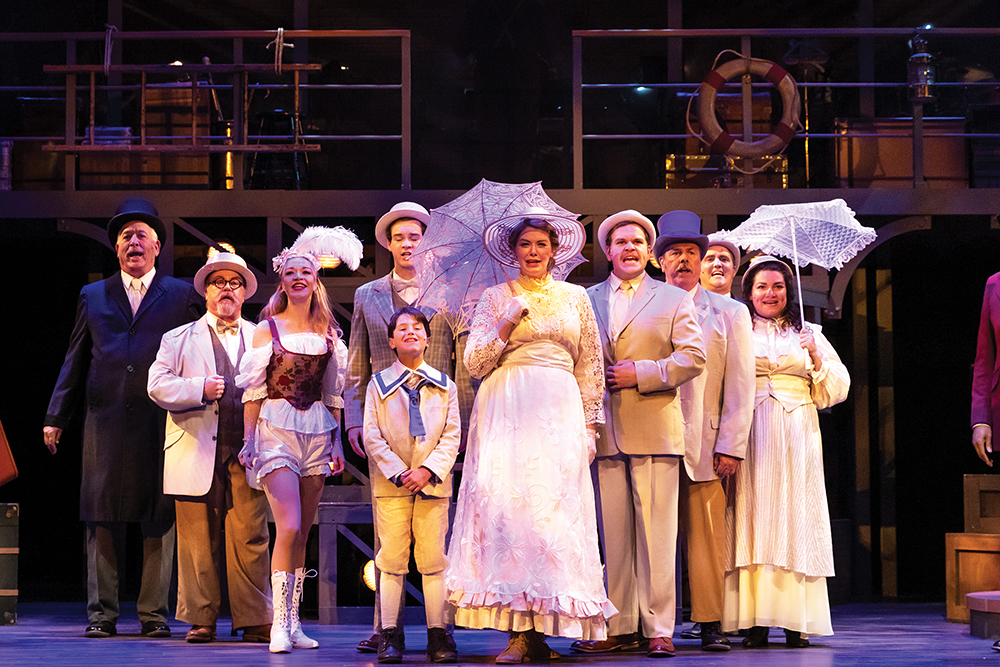The final production of Theatre Memphis’ 100th season is Ragtime, a Tony-winning musical with themes relevant to contemporary audiences, though the show is set at the turn of the 20th century. All aspects of this production shine, from the meticulously cultivated details of the set and costumes to the ensemble and individual performances of the cast.
Ragtime, based on the novel of the same name by E.L. Doctorow, is an emotional journey through topics of racism, classism, and sexism. Though the subject material is somber, the musical is rife with humor and hope. The multifaceted story is told through the eyes of a variety of characters with varying backgrounds living in the United States sometime just before the onset of World War I. It follows characters ranging from Tateh, a Jewish widower immigrating to America with his young daughter, to Booker T. Washington to Evelyn Nesbit, a vaudeville performer and 20th-century sex symbol.
I was afforded the opportunity to speak with the assistant director of Ragtime, Claire D. Kolheim, over the phone. Kolheim is a former resident company member of Playhouse on the Square, and in 2011 she played the role of Sarah in Ragtime. As part of the directorial team, Kolheim pointed out to me that no detail was left to chance. I mentioned that I appreciated the effect of having the orchestra present on the balcony of the set. “Having the orchestra exposed was an intentional move on the production team’s part,” Kolheim says. This decision was cleverly worked out in order to create the poignant moment where a coffin is fully lowered into the orchestra pit.
Despite the heavy themes of injustice explored in Ragtime, hope for the future generation permeates the show. Ragtime returns again and again to an idea that every parent will recognize: We must build a better tomorrow for our children. Emphatically sung by Coalhouse, played by Justin Allen Tate, “Make Them Hear You” highlights the importance of sharing true stories of injustice. When I ask Kolheim her thoughts on the motif of hope in the show, she replies with a poignant thought. “My friend, he always says that ‘We are our ancestors’ dreams realized.’ And, as Black people, you think about the injustices of slavery and the injustices of segregation and the lynchings and the mobbings and the hosing down, and you never think in that moment there’s going to be a glimmer of hope for tomorrow, but when you realize how far we have come as a people, there is hope for tomorrow. We may never see it in our lifetime, but that doesn’t mean that it’s not possible. … That’s something that’s inherent in the show.”
Another central thread running throughout the musical is sexism. This is mostly realized through the character called simply “Mother.” As Kolheim describes her, “She’s in her own prison. She’s in a society where a woman is seen and not heard. … She’s stuck in a patriarchal society that undermines her intelligence.” Mother is a dynamic character, who at the beginning of the show is content with her place both in her community and in her own household. We see that contentment change throughout the course of the musical, and again, Kolheim highlights the importance of details in this play. “Throughout the show, her hair and her attire start loosening up.” So the audience is able to see Mother quite literally loosening the restraints that have been systematically placed on her.
With performances ranging from witty and humorous to powerful and emotionally raw, the cast of Ragtime delivers a solid show that will leave audiences with something to think about long after the final bow is taken. During intermission, one bartender remarked to me, “That last one always gets me. I cry every time.” The “last one” she was referring to was the number, “Till We Reach That Day.” As I myself had teared up during the song, I knew what she meant.
This show is just as relevant in 2022 as it would have been 100 years ago. Thankfully, the ending is one of uplifting promise. As Kolheim puts it, “Together, we are stronger than we are apart, and I think that that is what the playwrights were hoping that any production of Ragtime would help us see.”
Ragtime runs through Sunday, June 26th, at the Lohrey Theatre (Theatre Memphis).
